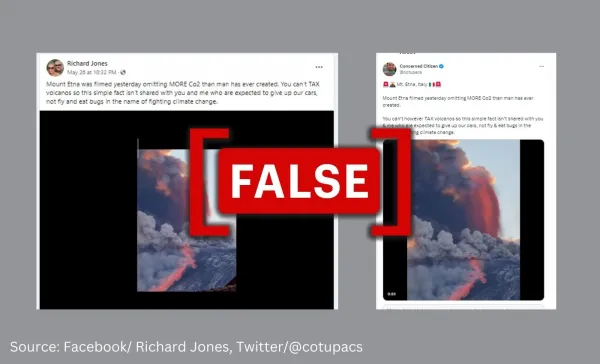By: Ishita Goel J
June 6 2023

The video shows a Mount Etna eruption from 2021, not 2023. Research shows that human activities emit more CO2 than volcanic eruptions.
Context
On May 21, 2023, Europe's most active volcano, Mount Etna, erupted just days after an eruption on May 14. Italy's National Institute of Geophysics and Volcanology (INGV) found that the eruption caused ashes to fall on the eastern Sicilian city of Catania and on one of the towns on Mount Etna's inhabited slopes. Euro News reported no recorded injuries. According to Reuters, the volcano erupts several times a year, spewing ash and lava over Catania.
Against this backdrop, a video showing a volcano erupting went viral at the end of May with the caption, "Mount Etna was filmed yesterday omitting MORE Co2 than man has ever created." Several users shared this video and iterations of the claim on Facebook and Twitter.
However, the video is old, and the CO2 emissions claim is incorrect.
In Fact
Through a reverse image search, we found that the viral video is from an eruption from the same volcano in 2021. On February 17, 2021, BBC News published a report carrying a similar video, writing, "Mount Etna: Ash clouds as Sicilian volcano erupts." The report stated that Mount Etna had erupted, causing Catania International Airport to be temporarily closed, although nearby towns were told not to worry. In the video, we could spot the house's roof and chimney, also seen in the viral video.
Similarly, Spanish news outlet Europa Press published a video on their YouTube channel on February 17, 2021, captioning it in Spanish, "Spectacular new eruption of the Etna volcano in Sicily." Between the 0:18 and 0:32 timestamps, this video also captured the eruption from an angle that showed the top of the house with the slanting roof seen in the BBC video. Both Europa and BBC credited the footage to Massimiliano Salfi. This confirms that the viral video shows an eruption from 2021, not 2023.
With respect to the claim that volcanic eruptions emit more CO2 than that produced by man, there is an ongoing debate on whether gases released during volcanic eruptions affect the atmosphere and their relation to climate change. A NASA article states that "human contributions to the carbon cycle are more than 100 times those from all the volcanoes in the world - combined." It continues in detail, clarifying that "the largest possible eruptions come from super-volcanoes like Yellowstone or Mount Toba (which erupt very rarely, about every 100,000 to 200,000 years or more), but the total annual CO2 emissions from human activities is like one or more Yellowstone-sized super-eruptions going off every year."
Furthermore, the United States Geological Survey (USGS) stated that all existing studies on global volcanic carbon dioxide emissions indicate that "present-day subaerial and submarine volcanoes release less than a percent of the carbon dioxide released currently by human activities." USGS explains that "the 1980 eruption of Mount St. Helens vented approximately 10 million tons of CO2 into the atmosphere in only 9 hours. However, it currently takes humanity only 2.5 hours to put out the same amount."
Logically Facts has previously debunked claims that volcanoes such as Mount Etna emit more carbon dioxide than human activity.
The Verdict
An old video from 2021 of an eruption from Mount Etna is being shared with the claim that it is recent and that volcanoes emit more CO2 than human activity. Research shows that while large volcanic eruptions can emit high amounts of CO2, human emissions far dwarf these numbers. Therefore, we have marked this claim as false.